| Srl | Item |
| 1 |
ID:
086137
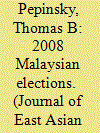

|
|
|
|
|
| Publication |
2009.
|
| Summary/Abstract |
Malaysia's twelfth general elections, held on March 8, 2008, dealt a stunning blow to the incumbent Barisan Nasional regime. For the first time since 1969, the coalition did not receive its customary two-thirds majority in the lower house of parliament. Moreover, the opposition was able to form governments in five out of eleven peninsular Malaysian states. This article uses electoral, economic, and demographic data to test a number of potential explanations for these outcomes. Evidence indicates that the regime's decreased majority is the consequence of non-Malay voters' rejecting the incumbent regime in favor of secular opposition parties.
|
|
|
|
|
|
|
|
|
|
|
|
|
|
|
|
| 2 |
ID:
086133
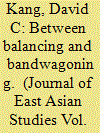

|
|
|
|
|
| Publication |
2009.
|
| Summary/Abstract |
Why has South Korea accommodated China, instead of fearing its growth and balancing against it? This article makes two central arguments. First, concepts of balancing and bandwagoning are fundamentally difficult to test, and to the extent that the theory can be tested, it appears to be wrong in the case of South Korea. In fact, we observe many cases in which rising powers are neither balanced nor "bandwagoned" but are simply accommodated with no fundamental change either way in military stance or alignment posture. Second, the factors that explain South Korean foreign policy orientation toward China are as much about interests as they are about material power. South Korea sees substantially more economic opportunity than military threat associated with China's rise; but even more importantly, South Korea evaluates China's goals as not directly threatening.
|
|
|
|
|
|
|
|
|
|
|
|
|
|
|
|
| 3 |
ID:
086135
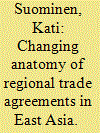

|
|
|
|
|
| Publication |
2009.
|
| Summary/Abstract |
The recent proliferation of regional trade agreements in the East Asian region can be seen as the most notable development in the region's trading panorama in recent years. Yet, very little is as yet understood about the anatomy of these agreements and, consequently, their full implications to the regional economy. This article strives to fill this gap by analyzing the structure of four dozen RTAs by their various key component parts, including tariff liberalization schedules, rules of origin, and competition policy, customs, investment, and services provisions. The results reveal that intra-Asian RTAs are generally quite rapidly liberalizing, with the exception of agriculture, but they are also quite thin in trade-related disciplines when compared with the more legalistic US trans-Pacific RTAs and those of Mexico and Chile. The proposed Free Trade Area of the Asia-Pacific would inherently be a construct of the political economy interests of these various constituent RTAs.
|
|
|
|
|
|
|
|
|
|
|
|
|
|
|
|
| 4 |
ID:
086138
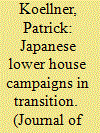

|
|
|
|
|
| Publication |
2009.
|
| Summary/Abstract |
Electioneering for the Japanese Lower House has undergone significant changes in recent years. While voter mobilization strategies still figure prominently in the local-level campaigns of individual candidates, political parties increasingly use voter-chasing strategies at the national level. Such chasing strategies, whose manifestations in Japan have so far included the manifesto and the media-spin approach, target in particular the growing number of independent voters. The concurrence of elements of continuity and change in electioneering has led to a "hybridization" of Lower House election campaigns. The article examines this phenomenon in the light of newer conceptual and theoretical approaches to electoral politics in democratic settings.
|
|
|
|
|
|
|
|
|
|
|
|
|
|
|
|
| 5 |
ID:
086136
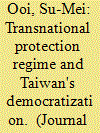

|
|
|
|
|
| Publication |
2009.
|
| Summary/Abstract |
On September 28, 1986, the Democratic Progressive Party was formed in defiance of restrictions set by a decades-old authoritarian regime, heralding the emergence of a fully competitive multiparty electoral system in Taiwan. Existing literature on Taiwan's democratic breakthrough suggests that international factors have played a significant role in bringing about democracy on the island. But what exactly were these external factors and how have they effected political change in Taiwan? A reexamination of the changing geopolitical and normative environments surrounding Taiwan suggests that they were crucial in shaping political development on the island in ways that have not been described in the literature. This article examines how the geopolitical and international normative environment enabled myriad external substate and nonstate actors to form a transnational "protection regime" around the political opposition, preserving the democratic movement and allowing it to reach its full mobilizational potential in time.
|
|
|
|
|
|
|
|
|
|
|
|
|
|
|
|